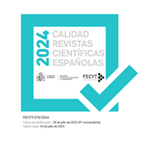Relationships as regulators of discourse interaction in Spanish
Resumen
In this paper we argue that in analyses of discourse interaction the relationship between participants must be considered as a parameter that conditions their linguistic behavior. A relationship is the result of the experiences shared by partners which create a “cultural code” between them. Each relationship brings a set of circumstances into play that regulates how members behave and how they interpret each other’s words and actions. Our proposal stems from observing how Spanish speakers who hold different types of relationships handle opposing points of view in conversation. Our results show that the expression and interpretation of dissent is linked to the interlocutors’ need to maintain the relationship in good terms. In order to protect relationships, the basic principle guiding interaction is to reach consensus. Additionally, the type and strength of the relationship condition the impact of expressions. Strong disagreement is allowed in strong relationships, as the risk for its affecting the relationship is low. Conversely, weak disagreement is preferred in weak relationships, since opposing views may result in higher impact.
Descargas
Descarga artículo
Licencia
La revista Círculo de Lingüística Aplicada a la Comunicación, para fomentar el intercambio global del conocimiento, facilita el acceso sin restricciones a sus contenidos desde el momento de su publicación en la presente edición electrónica, y por eso es una revista de acceso abierto. Los originales publicados en esta revista son propiedad de la Universidad Complutense de Madrid y es obligatorio citar su procedencia en cualquier reproducción total o parcial. Todos los contenidos se distribuyen bajo una licencia de uso y distribución Creative Commons Reconocimiento 4.0 (CC BY 4.0). Esta circunstancia ha de hacerse constar expresamente de esta forma cuando sea necesario. Puede consultar la versión informativa y el texto legal de la licencia.











